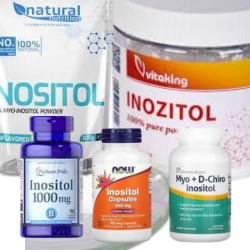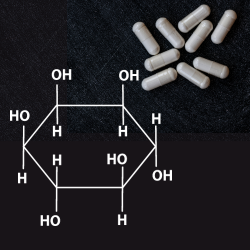Weight loss, It’s challenges, Berberine, Inositol and Resveratrol
Weight loss is a common goal for many individuals, but achieving it can be quite challenging. There are several challenges that one may face when trying to lose weight, both physical and psychological. To aid in weight loss, many individuals turn to supplements such as Berberine, Inositol, and Resveratrol. These supplements have been shown to have various health benefits that can support weight loss efforts.
Berberine, for example, has been found to improve insulin sensitivity and reduce inflammation in the body – both of which are essential factors in weight management.
Inositol, on the other hand, can help regulate hormones and support healthy brain function, which can aid in reducing stress and emotional eating.
Women with polycystic ovary syndrome (PCOS) may also benefit from using Inositol, as it has been shown to improve insulin resistance and regulate menstrual cycles.
Lastly, Resveratrol has been shown to increase metabolism and promote fat burning, making it a popular supplement for weight loss.
Natural Sources of These Supplements
While these supplements can be beneficial, it is always recommended to obtain essential nutrients and compounds from natural sources whenever possible.
Berberine can be found in herbs such as goldenseal and barberry, while Inositol is naturally present in fruits like oranges and cantaloupes. Resveratrol is commonly found in red grapes and berries.
Incorporating these foods into a healthy diet can provide the necessary nutrients without relying solely on supplements.

What Is Berberine?
Berberine is a compound found in various plants, such as goldenseal and barberry. It has been used for centuries in traditional Chinese medicine to treat various ailments, including digestive issues, infections, and inflammation.
More recently, Berberine has gained popularity as a weight loss supplement due to its ability to improve insulin sensitivity and reduce inflammation.
Women with polycystic ovary syndrome (PCOS) may benefit from using Berberine, as it has been shown to regulate menstrual cycles. Additionally, it has been found to have positive effects on cholesterol levels and may aid in reducing the risk of heart disease.


What Is Inositol?
Inositol is a type of carbohydrate that is naturally produced in the body. It plays a crucial role in regulating various hormones and supporting healthy brain function.
Polycystic ovary syndrome patients may benefit from using Inositol as it has been found to improve insulin resistance and regulate menstrual cycles.
Individuals without PCOS can also benefit from using Inositol, as it has been shown to reduce stress and promote relaxation. This can be helpful for those struggling with emotional eating.
Metabolic characteristics such as obesity and high blood pressure have also been linked to low levels of Inositol, making it a potentially beneficial supplement for weight loss.
How Does Inositol Work?
Inositol works by regulating insulin and cortisol levels in the body, which can have a significant impact on weight loss. It also acts as a natural mood stabilizer, reducing stress and emotional eating.
Additionally, Inositol helps balance hormones such as estrogen and testosterone, promoting overall hormonal balance and aiding in weight management.

What Is Resveratrol?
Resveratrol is a polyphenol compound found in red grapes, berries, and peanuts. It has been studied for its potential health benefits, including anti-inflammatory and antioxidant properties.
In terms of weight loss, Resveratrol has been shown to increase metabolism and promote fat burning, making it a popular supplement among those trying to lose weight.
Science Behind Weight Loss
While weight loss can be challenging, there is a scientific explanation for the various challenges one may face.
For instance, our bodies are programmed to hold onto fat as a survival mechanism. In times of food scarcity, fat storage was necessary for survival. However, in today’s world where food is abundant and easily accessible, this biological response can hinder weight loss efforts.
Moreover, our brains are wired to seek out high-calorie, palatable foods. This goes back to evolutionary times when food was scarce, and consuming calorie-dense foods was necessary for survival.
Understanding the science behind weight loss can help individuals make more informed decisions and better navigate through challenges during their weight loss journey.
Polycystic Ovary Syndrome (PCOS)
One medical condition that can significantly impact weight loss efforts is Polycystic Ovary Syndrome (PCOS). This hormonal disorder affects millions of women worldwide and can make it challenging to lose weight due to insulin resistance, hormonal imbalances, and metabolic issues.
Insulin resistance, a hallmark of PCOS, makes it difficult for the body to process and use glucose effectively, leading to elevated blood sugar levels and weight gain.
Moreover, hormonal imbalances such as high levels of testosterone can lead to increased fat storage in the abdomen and reduced metabolism.
Women with PCOS may also experience difficulties in regulating their menstrual cycles, which can further complicate weight loss
It is essential for individuals with PCOS to work closely with their healthcare providers when trying to lose weight and to address any underlying medical issues that may be hindering their progress.

Polycystic Ovary Syndrome Patients and Supplements
Some studies have shown that supplements, such as Inositol, can be beneficial for individuals with PCOS. In one study, women with PCOS who took Inositol saw improvements in their hormone levels and experienced weight loss.
Berberine has also been shown to be effective in managing PCOS symptoms, such as insulin resistance and hormonal imbalances.
Insulin Resistance and Weight Loss
Insulin resistance is a common issue among individuals with PCOS, which can make weight loss challenging. When the body becomes resistant to insulin, it cannot effectively use glucose for energy, leading to fat storage.
In addition to supplements such as Berberine and Inositol, regular exercise and a healthy diet can also aid in managing insulin resistance and promoting weight loss.
How Berberine Works For Weight Loss
Berberine has been found to have multiple mechanisms of action that support weight loss. One of the primary ways it aids in weight loss is by improving insulin sensitivity.
Insulin is a hormone responsible for regulating blood sugar levels and fat storage. When our bodies become resistant to insulin, this can lead to weight gain and other health issues.
Berberine has been shown to improve insulin sensitivity, allowing the body to better regulate blood sugar levels and use fat for energy instead of storing it.
How Inositol Works For Weight Loss
Inositol works primarily by regulating hormones in the body, specifically those related to metabolism and appetite. It can also play a role in managing stress and reducing emotional eating.
By balancing hormones, Inositol can help with weight loss by regulating the body’s metabolism and reducing cravings for unhealthy foods.
How Resveratrol Works For Weight Loss
Resveratrol has several mechanisms of action that contribute to its weight loss benefits. It can increase metabolism, promote fat burning, and reduce inflammation in the body.
Additionally, Resveratrol has been shown to activate a gene called SIRT1, known as the “skinny gene,” which helps regulate metabolism and reduce fat storage.

Can I Combine Inositol and Berberine?
As with any supplement, it is essential to consult a healthcare professional before combining Inositol and Berberine. While there is no evidence of adverse effects when taking these supplements together, it is always best to err on the side of caution.
It may also be helpful to start with one supplement at a time and monitor its effects on your body before adding another. This can help you determine which supplement is most beneficial for you and prevent any potential interactions.
What is Better Inositol or Berberine?
Both Inositol and Berberine have their own unique benefits and can be beneficial for weight loss. However, there is no clear answer as to which one is better.
Some individuals may find more success with Inositol due to its role in hormone regulation, while others may benefit more from Berberine’s effect on insulin sensitivity.
Ultimately, it may come down to individual needs and preferences, and consulting a healthcare professional can help determine which supplement may be more suitable for you.
Women With Polycystic Ovary Syndrome and Inositol
Inositol has been studied for its effects on women with Polycystic Ovary Syndrome (PCOS), a hormonal disorder that can lead to weight gain, among other symptoms.
Research has shown that supplementation with Inositol can improve insulin sensitivity and regulate hormone levels in women with PCOS, leading to weight loss and improved overall health.
It may also help with other symptoms of PCOS, such as irregular periods and fertility issues. However, it is essential to consult a healthcare professional before adding Inositol or any supplement to your routine. Overall, incorporating these natural compounds, such as Berberine and Inositol, into a healthy lifestyle can have various benefits for weight loss and overall health. It is important to remember that supplements should not be relied upon solely for weight loss and should be used with a comprehensive plan.
Sex Hormone Bind Globulin
Sex Hormone-Binding Globulin (SHBG) is a protein that binds to sex hormones, including estrogen and testosterone. This binding helps regulate the levels of these hormones in the body.
Studies have shown that Inositol supplementation can increase SHBG levels, which may help balance hormone levels and benefit weight loss efforts in individuals with hormonal imbalances.
Maintaining healthy hormone levels is crucial for weight loss, making Inositol a valuable addition to any weight loss regimen. However, as with any supplement, it is essential to consult a healthcare professional before use.
Medications That Should Not Be Taken With Berberine or Resveratrol
Berberine and Resveratrol have been shown to interact with certain medications, so it is crucial to inform your healthcare provider before supplementing with either of these compounds.
Berberine may interact with drugs that lower blood sugar levels, such as insulin and metformin. Similarly, Resveratrol may interact with blood thinners like warfarin and anti-inflammatory medications like ibuprofen.

Berberine and Resveratrol Together
There as been some excitement in using berberine, resveratrol and inositol together in weight loss. While they do all have there health benefits. They are not a magic bullet for weight loss. In one small study when the combined berberine and resveratrol together and assessed weight loss. On average people lowered there BMI an average of 0.25. This is a small change in BMI but can be a great first step in the right direction for weight loss.
However, more research needs to be done on the effects of combining these supplements together and their potential interactions with medications.
Diet and exercise remain the most crucial factors in weight loss, and supplements should only be used as part of a comprehensive approach. So while combining these natural compounds may have potential benefits for weight loss, it is essential to maintain a healthy lifestyle overall for optimal results.
Incorporating These Supplements Into a Healthy Lifestyle
While supplements like Inositol, Berberine, and Resveratrol can be beneficial for weight loss, they should not be relied upon as the sole means of losing weight. Instead, they should be incorporated into a healthy lifestyle that includes a balanced diet and regular exercise.
Additionally, it is essential to remember that weight loss is not a one-size-fits-all approach. What may work for one person may not necessarily work for another. It is crucial to listen to your body and make informed decisions when incorporating supplements into your daily routine.

Why Don’t Doctors Prescribe Berberine?
While some healthcare providers may recommend Berberine for certain conditions, it is not commonly prescribed by doctors. This may be due to limited research on its effectiveness and potential interactions with other medications.
However, as more studies continue to emerge on the benefits of Berberine, its use may become more widespread in clinical settings. It is always best to consult with a doctor before starting any new supplement to ensure it is safe and appropriate for your individual needs.
How Do These Supplements Compare to Semaglutide?
Semaglutide is a medication used to treat obesity and has been shown to be more effective than other weight-loss drugs to date. While Inositol, Berberine, and Resveratrol are natural supplements that may aid in weight loss, they do not have the same potency or effectiveness as Semaglutide.
However, these supplements can still be beneficial when incorporated into a healthy lifestyle and may be a more natural alternative for some individuals. Again, it is essential to consult with a healthcare professional before starting any new supplement or medication for weight loss.
Conclusion
In conclusion, supplements like Inositol, Berberine, and Resveratrol can aid in weight loss by improving insulin sensitivity, regulating hormones, and promoting fat burning. It is always best to consult with a healthcare professional before combining these supplements or adding them to your routine, as there may be potential interactions with other medications. Additionally, incorporating these supplements into a healthy lifestyle that includes a balanced diet and regular exercise is essential for long-term weight loss success.
We hope you found this deep dive into berberine, resveratrol, and inositol insightful and valuable in your journey towards a healthier lifestyle. But knowledge about supplements is only one piece of the puzzle. To fully unlock the secret to sustainable weight loss, it’s essential to have a well-rounded approach that also includes diet.
That’s why we’ve created a complimentary video course specifically designed to help you discover what you should eat to lose weight without feeling like you’re starving yourself. With our unique blend of clinical expertise and genuine care, this course will empower you to take control of your nutrition and set you on a path to lasting confidence. Click here to access the video course and take the first step towards a better you.
References:
https://www.healthline.com/health/polycystic-ovary-disease
https://www.uclahealth.org/news/semaglutide-weight-loss-what-you-need-know
https://www.ncbi.nlm.nih.gov/pmc/articles/PMC8875143/
https://www.sciencedirect.com/science/article/abs/pii/S2405457720300802

